Резултати од пребарување
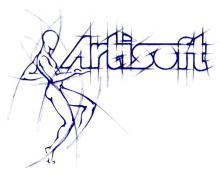
Компанијата Артисофт има потреба од проширување на тимот. Со таа цел имаме потреба од практиканти, кои по завршената пракса ќе имаат и можност за вработување во нашата компанија. Кандидатите треба да се во последната студиска година.
Потребен е профил на личност која знае да размислува проактивно, сака да стекнува нови вештини и знаења и преку тимска работа да го даде својот придонес во насока на постигнување на целите на компанијата.
Се нуди можност за одлични услови за работа и професионална надоградба.
Работниот ангажман за време на праксата опфаќа 40 часовна работна недела со флексибилно работно време.
Потребни квалификации:
- Основни познавања од областа на: HTML, CSS, JavaScript, PHP, …
- Основни познавања од областа на бази на податоци: PostgreSQL, MySQL, Oracle, …
- Солидно познавање на англиски јазик.-
- Кандидатите со познавање на ColdFusion ќе имаат предност.
Опис на работно место:
- Организирана работа во тим;
- Full stack development
- Комуникација со клиенти;
Заинтересираните кандидати можат да ги достават своите CV-а на
со назнака “За пракса во Артисофт “. Рокот за пријавување е до 17.02.2019 година.

Имаме чест и задоволство да ве поканиме на настанот кој се организира со цел да се споделат меѓународните искуства од САД и Балканот за развој на нови технологи и бизниси.
Целта на оваа програма е да им го воедначиме знаењето на сите студенти и да ги подготвиме за следната Акцелераторска програма. Рокот за пријавување е до 15 април со пополнување на апликацијата на следниот линк
Програма: од идеа до инвестиции / Venture Academy Spring 2019 (април-мај 2019).
Недела 1
Ден 1 (22 април): Работилница за стартапи/презентации на релевантни теми:
• Како да започнеш сопствен бизнис
• Развој на продукти според методологијата “Lean Product Development”
• Маркетинг и продажба
• Пристап до финансии
• Што бараат инвеститорите
Ден 2 (23 април): Развој на бизнис модел (канвас) и презентација
Ден 3 (24 април): Подготовка на бизнис моделот и презентација
Ден 4 (25 април): Подготовка на бизнис моделот со подршка од менторите на Акцелераторот УКИМ
Недела 2
Ден 5-8 (Мај 6-10): Вклучени 5 професори + 75 студенти на постдипломски студии од Универзитетот за применети науки во Луцерн, со цел да се обезбеди неопходната поддршка на нашите студентските тимови за понатамошен развој на нивните бизнис идеи.
Ден 9 (Мај 11): Презентација на бизнис идеите.
Објавата на фејсбук може да се најде на следниот линк: https://www.facebook.com/acceleratorukim/.
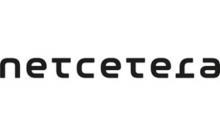
Netcetera MK објавува огласи за вработување. Во продолжение се огласите. Отворените позиции се однесуваат на нашите локации во Скопје, Охрид и Битола.
== Оглас 1
Netcetera објавува отворени конкурси за работа и пракса и ги поканува студентите на ФИНКИ да аплицираат.
Во моментов, за претставништвото во Скопје, отворени се следните позиции:
- Spring internship
- Spring Data Scientist Internship
- UI Design / Development Internship
- DevOps Engineer
- UX Engineer
- QA and Automation Engineer
- Software Architect
- Tech Lead
- Senior Software Engineer - Digital Publishing
Сите заинтересирани повеќе информации можат да добијат на следниот линк: https://www.netcetera.com/home/careers.html
== Оглас 2
Netcetera објавува отворени конкурси за работа и ги поканува студентите на ФИНКИ да аплицираат.
Во моментов, за претставништвото во Охрид, отворени се следните позиции:
- Spring internship
- Spring Data Scientist Internship
- DevOps Engineer
- Software Architect
- Tech Lead
Сите заинтересирани повеќе информации можат да добијат на следниот линк: https://www.netcetera.com/home/careers.html
== Оглас 3
Netcetera објавува отворени конкурси за работа и ги поканува студентите на ФИНКИ да аплицираат.
Во моментов, за претставништвото во Битола, отворени се следните позиции:
- Spring internship
- Spring Data Scientist Internship
- DevOps Engineer
- Software Architect
- Tech Lead
Сите заинтересирани повеќе информации можат да добијат на следниот линк: https://www.netcetera.com/home/careers.html

Netcetera и Google Developers Group Skopje ве повикуваат на овогодинешното издание на Google HashCode. Исто како и минатат година, така и оваа година нема да има физичко присуство, туку натпреварувачите ќе бидат организирани во виртуелни хабови.
Квалификацискиот натрпевар се одржува на 24 февруари од 18:30 до 22:30 часот, а регистрациите се веќе отворени. Сите заинтересирани може да се пријават до 23 февруари. Во Македонија има три виртуелни локации: Netcetera, Inellipse – Software Solutions и Qworkingo - Coworking Space Bitola.
Hash Code е тимски, програмерски натпревар, организиран од Google, за студенти и професионалци од целиот свет. Тимовите имаат целосна слобода за избор на својот тим, како и за избор на програмскиот јазик. За време на натпреварот, тимовите ќе треба да ги решат инженерските предизвици кои го поставува Google. Натпреварот е поделен во две рунди; првата е квалификациска, а втората е финална рунда и ќе се одржи подоцна.
Како и претходната година, финалниот натпревар ќе се одржи онлајн, на 30ти Април од 07:00 до 11:00 часот.
Повеќе информации за HashCode 2022 и за локациите во Македонија може да пронајдете на Facebook настанот HashCode 2022 Macedonia.
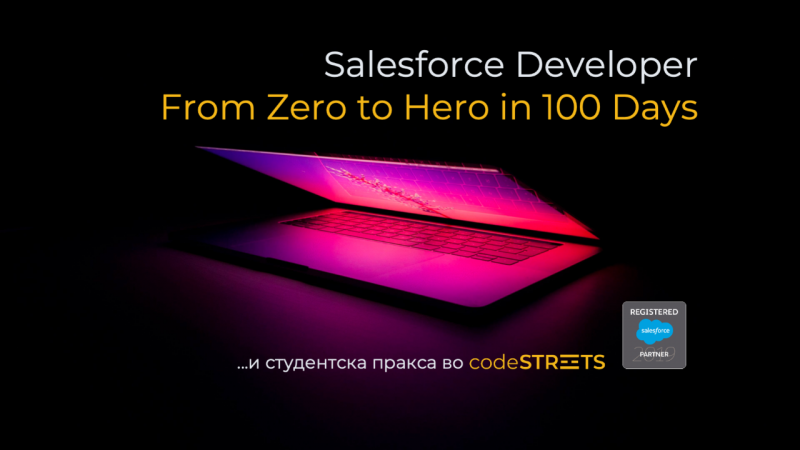
codeSTREETS, првиот официјален регистриран партнер на Salesforce во Македонија, нуди пракса за заинтересирани студенти кои сакаат да ја започнат својата кариера како сертифицирани професионалци за еден од најголемите технолошки гиганти, Salesforce.
ЗОШТО ДА СЕ ПРИЈАВИТЕ?
· За да станете дел од глобалната Salesforce економија вредна трилиони долари
· Да добиете пристап до високоплатени работни позиции ширум светот
· Да работите во глобални тимови составени од врвни Salesforce професионалци
· Да работите на возбудливи проекти во најуспешните европски и светски компании
· Да стекнете знаења и вештини кои нема да застарат следните децении
· Да научите и усовршите нови технологии (Аpex, Lightning Web Components, Aura)
· Да го поддржите светското движење за еднаквост и одржливост
ВРЕМЕТРАЕЊЕ НА ПРАКСА
100 денови
КAKO ЌЕ СЕ ОДВИВА
Хибридно (онлајн и во канцелариите на codeSTREETS)
УЧЕСНИЦИ
Студенти од ФИНКИ кои се во завршни години од студиите.
БРОЈ НА УЧЕСНИЦИ 20
НАЧИН НА РАБОТА:
Обука за полагање на Salesforce сертификати преку практична работа на проекти
НАЧИН НА ПРИЈАВА
При пријавата за учество студентите треба да испратат CV или LinkedIn профил на career@codestreets.com и да напишат нешто за себе.
ВЕБ СТРАНА: https://codestreets.com/salesforce-developer-from-zero-to-hero.html

codeSTREETS, првиот официјален регистриран партнер на Salesforce во Македонија, нуди бесплатна академија за заинтересирани студенти кои сакаат да ја започнат својата кариера како сертифицирани професионалци за еден од најголемите технолошки гиганти, Salesforce.
ЗОШТО ДА СЕ ПРИЈАВИТЕ?
· За да станете дел од глобалната Salesforce економија вредна трилиони долари
· Да добиете пристап до високоплатени работни позиции ширум светот
· Да работите во глобални тимови составени од врвни Salesforce професионалци
· Да работите на возбудливи проекти во најуспешните европски и светски компании
· Да стекнете знаења и вештини кои нема да застарат следните децении
· Да научите и усовршите нови технологии (Аpex, Lightning Web Components, Aura)
· Да го поддржите светското движење за еднаквост и одржливост
ДАТУМ
1 ноември 2022 - 1 февруари 2023
ВРЕМЕТРАЕЊЕ НА АКАДЕМИЈАТА
100 денови
КAKO ЌЕ СЕ ОДВИВА
Хибридно (онлајн и во канцелариите на codeSTREETS)
УЧЕСНИЦИ
Студенти од ФИНКИ кои се во завршни години од студиите.
БРОЈ НА УЧЕСНИЦИ
20
НАЧИН НА РАБОТА
Обука за полагање на Salesforce сертификати преку предавања, консултации и практична работа на проекти.
НАЧИН НА ПРИЈАВА
При пријавата за учество студентите треба да испратат CV или LinkedIn профил на career@codestreets.com и да напишат нешто за себе.
ВЕБ СТРАНА: https://codestreets.com/salesforce-developer-from-zero-to-hero.html
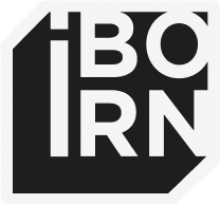
If you're ready to take the next step in your growth and join a company that values curiosity, quality, and innovation, we’re excited to meet you! At IBORN, you’ll have the opportunity to obtain hands-on experience and launch your career as a Java Software Engineer. With us, you can learn, experiment, and drive impactful results while expanding your skills in software development practices and tools.
This is the right opportunity for you if you have:
- Strong knowledge of databases, including entities, attributes, and relationships;
- Practical, foundational experience with the Java programming language and familiarity with the Spring Boot framework;
- A solid understanding of frontend frameworks and structures;
- A passion for creating team-oriented solutions to complex engineering challenges;
- Excellent English communication skills.
What we offer:
- A team of people to support, help, and guide you throughout your internship program;
- A creative culture defined by open communication and fair feedback;
- Growth opportunity - we value people and we want you to grow with us;
- Opportunity to work within a team and be a part of our projects;
- An environment to get great exposure to modern technologies, methodologies, and invaluable experience allowing you to explore, fix, and implement solutions.
Apply now: https://bit.ly/4hJUyNR
On behalf of Eurostat, we are pleased to announce the final round of the European Statistics Awards for Web Intelligence, focusing on Multinational Enterprise (MNE) Groups Data: Discovery & Extraction Challenges. Running in parallel, these competitions aim to drive innovation, develop new methodologies, and benchmark approaches for processing web content in MNE Group data analysis.
Both competitions are now open for registration and the deadline for registering is 22 April 2025.
By running both challenges in parallel, the European Statistics Awards Programme aims to enhance MNE Group Data analysis by enabling those participants that develop integrated pipelines to benefit from possible synergies, while also allowing specialised teams to fully focus on either of the two challenges.
The competition pursues three key goals: driving innovation in web intelligence for statistics, benchmarking approaches for discovering financial MNE Group data sources, and evaluating extraction methods using advanced technologies. This initiative seeks to advance methodologies and improve statistical practices in MNE Group analysis.
We believe that the researchers in your country (in particular data scientists) would be most interested in signing up for this opportunity.
Teams (1–5 members) will have the opportunity to apply their Web Intelligence expertise and programming skills (particularly in Python and R) to a real-world use case while competing for substantial prizes.
Prizes for each challenge include:
- €10 000 for first place in the Accuracy Award
- €10 000 for first place in the Reusability Award
- €5 000 for first place in the Innovativeness Award
A team securing first place in all three categories can win up to €25 000 per challenge. By achieving the top prize in both challenges, a team could earn a total of up to €50 000.
We would therefore appreciate if you could:
- post the announcement (below), flyer , a link to the European Statistics Awards homepage on your website; and press release on the Eurostat website;
- distribute the announcement (below) and flyer to your mailing lists (via a newsletter or a mail message);
- share the announcement and flyer with your research networks;
- repost LinkedIn or X announcements with #EUStatisticsAwards, #EUwebIntelligenceAwards
If you would like to compete yourself please register at https://statistics-awards.eu/accounts/signup/
Announcement
Eurostat is pleased to announce the final round of the European Statistics Awards for Web Intelligence, with a focus on Multinational Enterprise (MNE) Groups Data: Discovery & Extraction Challenges. Running in parallel, these competitions aim to drive innovation, develop new methodologies, and benchmark approaches for processing web content in MNE Group data analysis.
Both competitions are now open for registration and the deadline for registering is 22 April 2025.
By running both challenges simultaneously, the European Statistics Awards Programme aims to strengthen MNE Group Data analysis by enabling those participants that develop integrated pipelines to benefit from possible synergies, while also allowing specialised teams to fully focus on either of the two challenges.
The competition focuses on three main objectives: fostering innovation in web intelligence for statistics, benchmarking methods for identifying financial MNE Group data sources, and assessing extraction techniques using advanced technologies. This initiative contributes to refining methodologies and enhancing statistical practices in MNE Group analysis.
Do you know how to code in Python or R? Register by 22 April 2025 and try your chances on your own or with a team of colleagues.
You and your team have the chance to win up to €50 000 by securing first place in all three award categories across both competitions.
The top prize breakdown per competition includes:
- €10 000 for Accuracy Award
- €10 000 for Reusability Award
- €5 000 for Innovativeness Award
Additionally, second and third place prizes are awarded as follows:
- Accuracy Award: €5 000 (2nd place) | €3 000 (3rd place)
- Reusability Award: €5 000 (2nd place) | €3 000 (3rd place)
- Innovativeness Award: €3 000 (2nd place) | €1 000 (3rd place)
By placing first in all three categories in one competition, your team could win up to €25 000, and by doing so in both competitions, you could win a total of €50 000.
For more information on the European Statistical Awards Programme, please refer to the European Statistics Awards website or drop us a line to learn about any further details.
Many thanks in advance for considering signing up, and for sharing this information,
The European Statistics Awards secretariat
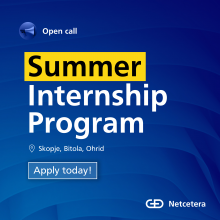
G+D Netcetera – Summer Internship 2025
G+D Netcetera’s 2025 Summer Internship Program is now open! Apply today for an opportunity to spend your Summer developing your skills, deepening your knowledge, and gaining practical experience on real projects using the latest technologies - all while receiving guidance from a dedicated mentor and support from experienced colleagues.
G+D Netcetera guarantees:
- a smooth onboarding process, comprehensive training, and ongoing learning initiatives
- all the necessary equipment
- your health, safety, and well-being as top priorities
- a culture of care, collaboration, and continuous improvement
Additionally, you will join an inclusive and diverse work environment that values the unique contributions of individuals from various disciplines, backgrounds, and lifestyles.
Take the next step in your professional journey by applying for an internship at G+D Netcetera.
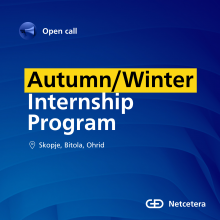
G+D Netcetera’s 2025 Autumn/Winter Internship Program is now open! Apply today for an opportunity to develop your skills, deepen your knowledge, and gain practical experience on real projects using the latest technologies - all while receiving guidance from a dedicated mentor and support from experienced colleagues.
G+D Netcetera guarantees:
- a smooth onboarding process, comprehensive training, and ongoing learning initiatives
- all the necessary equipment
- your health, safety, and well-being as top priorities
- a culture of care, collaboration, and continuous improvement.
Additionally, you will join an inclusive and diverse work environment that values the unique contributions of individuals from various disciplines, backgrounds, and lifestyles.
Take the next step in your professional journey by applying for an internship at G+D Netcetera.
Software Engineer Internship - https://bit.ly/software-eng-intern-25-aw
Machine Learning Engineer Internship - https://bit.ly/ML-intern-25-aw
QA Internship- https://bit.ly/qa-intern-25-aw

